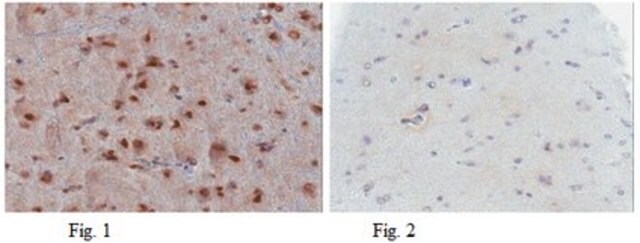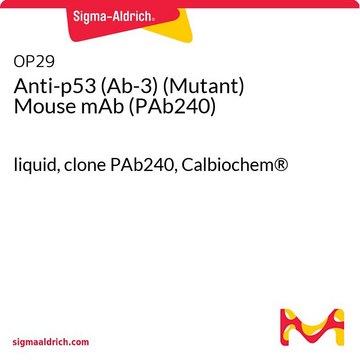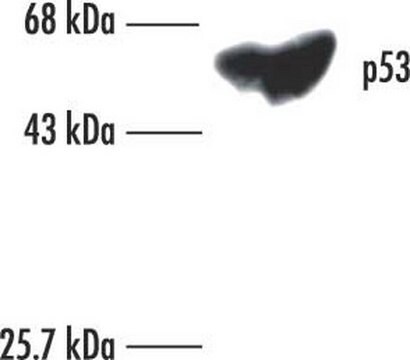OP29L
Anti-p53 (Ab-3) (Mutant) Mouse mAb (PAb240)
lyophilized, clone PAb240, Calbiochem®
Sinónimos:
Anti-p53 antibody
About This Item
Productos recomendados
origen biológico
mouse
Nivel de calidad
forma del anticuerpo
purified antibody
tipo de anticuerpo
primary antibodies
clon
PAb240, monoclonal
Formulario
lyophilized
no contiene
preservative
reactividad de especies
hamster, rat, mouse, bovine, chicken, human
no debe reaccionar con
Xenopus
fabricante / nombre comercial
Calbiochem®
condiciones de almacenamiento
OK to freeze
isotipo
IgG1
Condiciones de envío
ambient
temp. de almacenamiento
2-8°C
modificación del objetivo postraduccional
unmodified
Información sobre el gen
human ... TP53(7157)
Descripción general
Inmunógeno
Aplicación
Frozen Sections (10 µg/ml)
Gel Shift (see comments)
Immunoblotting (5 µg/ml)
Immunofluorescence (1-20 µg/ml)
Immunoprecipitation (1 µg per sample)
Paraffin Sections (see application references)
Advertencia
Forma física
Reconstitución
Nota de análisis
SK-OV-3 cells
A431, Hs27 (wild-type p53), or SK-BR-3 cells or breast carcinoma
Otras notas
Greenblatt, M.S., et al. 1994. Cancer Res.54, 4855.
Barak, Y., et al. 1993. EMBO J.12, 461.
Kastan, M.B., et al. 1992. Cell71, 587.
Kuerbitz, S.J. 1992. Proc. Natl. Acad. Sci. USA89, 7491.
Lane, D.P. 1992. Nature358, 15.
Kastan, M.B., et al. 1991. Cancer Res.51, 6304.
Información legal
¿No encuentra el producto adecuado?
Pruebe nuestro Herramienta de selección de productos.
Código de clase de almacenamiento
11 - Combustible Solids
Clase de riesgo para el agua (WGK)
WGK 1
Certificados de análisis (COA)
Busque Certificados de análisis (COA) introduciendo el número de lote del producto. Los números de lote se encuentran en la etiqueta del producto después de las palabras «Lot» o «Batch»
¿Ya tiene este producto?
Encuentre la documentación para los productos que ha comprado recientemente en la Biblioteca de documentos.
Nuestro equipo de científicos tiene experiencia en todas las áreas de investigación: Ciencias de la vida, Ciencia de los materiales, Síntesis química, Cromatografía, Analítica y muchas otras.
Póngase en contacto con el Servicio técnico








